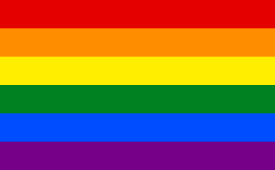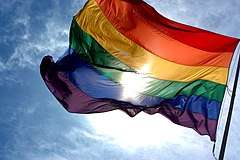LGBT rights in Greenland
| LGBT rights in Greenland | |
|---|---|
.svg.png) Location of Greenland
| |
| Same-sex sexual intercourse legal status |
Legal since 1933, age of consent equalized in 1977 (Danish law) |
| Gender identity/expression | No current laws |
| Military service | LGBT people allowed to serve openly (Joint Defence Command) |
| Discrimination protections | Some sexual orientation protections (see below) |
| Family rights | |
| Recognition of relationships | Same-sex marriage since 2016 |
| Adoption | Full adoption rights since 2016 |
Lesbian, gay, bisexual, transgender (LGBT) rights in Greenland are similar to those in Denmark. Same-sex sexual activity is legal, with an equal age of consent, and there are some anti-discrimination laws protecting LGBT people. Same-sex couples have had access to registered partnerships, which provided them with nearly all of the rights provided to married opposite-sex couples from 1996 to 2016. On 1 April 2016, a law repealing the registered partnership law and allowing for same-sex marriages to be performed came into effect.
In 1979, Denmark granted Greenland autonomy under the Home Rule Act and in 2009 extended self-government, although it still influences the island's culture and politics. Greenland is considered to be very socially liberal towards LGBT people. Acceptance of homosexuality and same-sex relationships is very high, and reports of discrimination against LGBT people are extremely rare. Nonetheless, due to Greenland's small and scattered population, a lot of Greenlandic LGBT people have chosen to move to Copenhagen in Denmark.[1]
Law regarding same-sex sexual activity
As is the case with Denmark, same-sex sexual activity is not a crime.[2] It was legalized by Denmark in 1933, and age of consent equalized in 1977, two years prior to the Home Rule Act.
Recognition of same-sex relationships

Greenland adopted Denmark's registered partnership law on 1 July 1996.[3] There was some opposition to registered partnerships from clergy and conservative lawmakers, who later chose to abstain from voting. The bill was passed in the Greenlandic Parliament 15-0 with 12 abstentions, and later by the Danish Parliament 104-1.[1] The first same-sex couple to register did so in 2002.[1] Registered partnerships are called nalunaarsukkamik inooqatigiinneq in Greenlandic.
In March 2015, MP Justus Hansen, from the Democrats, a centre-right political party, introduced a bill to legalise same-sex marriage in Greenland, which also included adoption rights and other changes to Greenlandic family law. The bill was approved unanimously (27-0) by the Parliament of Greenland on 26 May 2015, but required Danish approval before coming into effect. Initially, the bill was to come into effect on 1 October 2015, but lapsed due to the Danish general elections in June 2015. The parliamentary procedure therefore had to start over and the new Danish Liberal Government put an identical bill on the agenda for its first reading on 5 November 2015.[4] On 19 January 2016, the Folketing (Danish Parliament) approved the proposal 108-0 and the bill was given royal assent by Queen Margrethe II on 3 February 2016. The parts of the law relating to marriage went into effect on 1 April 2016.
Same-sex marriage became legal on 1 April 2016.[5][6] Application in Greenland of the Registered Partnership Act was repealed the day the new law took effect.
Adoption and family planning
On 1 June 2009, stepchild adoption for same-sex couples became legal.[7] A law regarding IVF for female couples was approved in 2006. The parts of the same-sex marriage law allowing same-sex couples to adopt children went into effect on 1 July 2016.[8]
Discrimination protections
Since 2010, Greenland has outlawed hate speech and hate crimes on the basis of sexual orientation.[2]
Greenland possesses no anti-discrimination laws in employment, goods and services, health services or education. Danish anti-discrimination laws do not apply to Greenland. Greenland's only anti-discrimination law is Act no. 7 of April 11, 2003 on equality between women and men, which bans gender-based discrimination. Discrimination on the grounds of race, religion, ethnicity, sexual orientation, gender identity and disability is not outlawed.
The Human Rights Council of Greenland, funded by the state budget, promotes and protects human rights in Greenland. It is commissioned to participate in the strengthening and consolidation of human rights, and works closely with the Danish Institute for Human Rights.[9]
Other than taking a case to court or referring to the Greenlandic Ombudsman, no national complaints procedure exists in which one can bring forth legal complaints of discrimination.[10]
Nevertheless, reports of discrimination based on sexual orientation are very rare.[1]
LGBT rights movement in Greenland
There was an LGBT rights organization called "Qaamaneq" (Light), which had organized social events.[11] The organization was reestablished in 2014 as LGBT Qaamaneq.[12]
On 15 May 2010, Greenland held its first pride parade in Nuuk.[13][14][15] It was attended by about 1,000 people.[1]
Summary table
| Same-sex sexual activity legal | |
| Equal age of consent | |
| Anti-discrimination laws in employment | |
| Anti-discrimination laws in the provision of goods and services | |
| Anti-discrimination laws in all other areas (incl. indirect discrimination, hate speech) | |
| Anti-discrimination laws concerning gender identity | |
| Same-sex marriage(s) | |
| Recognition of same-sex couples | |
| Stepchild adoption by same-sex couples | |
| Joint adoption by same-sex couples | |
| LGBT people allowed to serve in the military | |
| Right to change legal gender | |
| Access to IVF for lesbians | |
| Commercial surrogacy for gay male couples | |
| MSMs allowed to donate blood |
See also
References
- 1 2 3 4 5 "Gay Greenland--Past and Present - GlobalGayz". www.globalgayz.com. Retrieved 27 May 2018.
- 1 2 "Gay Greenland News & Reports". 8 June 2009. Retrieved 27 May 2018.
- ↑ Yuval Merin, Equality for same-sex couples. Published in 2002.
- ↑ "Kalender". Folketinget. Retrieved 27 May 2018.
- ↑ Dam, Camilla (1 April 2016). "Første homoseksuelle par viet i kirken". Greenlandic Broadcasting Corporation (in Danish). Archived from the original on 2 April 2016. Retrieved 3 April 2016.
- ↑ Williams, Joe (1 April 2016). "Same sex couples can now officially marry in Greenland". PinkNews. Archived from the original on 2 April 2016. Retrieved 2 April 2016.
- ↑ (in Danish) Anordning om ikrafttræden for Grønland af lov om ændring af lov om registreret partnerskab m.v.
- ↑ L35/Beh1-12/140 L 35 Forslag til lov om ændring af myndighedsloven for Grønland, lov om ikrafttræden for Grønland af lov om ægteskabets retsvirkninger, retsplejelov for Grønland og kriminallov for Grønland.
- ↑ "Denmark". Retrieved 27 May 2018.
- ↑ "Universal Periodic Review of Denmark, 24th session of the UN Human Rights Council 2016" (PDF). Retrieved 27 May 2018.
- ↑ "Denmark - GlobalGayz". www.globalgayz.com. Retrieved 27 May 2018.
- ↑ "Ny landsforening for lesbiske, bøsser, bisexuelle og transkønnede". Greenlandic Broadcasting Corporation, August 18, 2014.
- ↑ "Nuuk: 1st Gay Pride parade on May 15". Sikunews. Retrieved 19 January 2011.
- ↑ "Nuuk's Gay Pride parade a success". Sikunews. Retrieved 19 January 2011.
- ↑ Allen, Dan. "WorldWatch: Greenland's First Gay Pride | Gay & Lesbian Travel Guides". Trip Out Gay Travel. Retrieved 19 January 2011.
- ↑ "Archived copy" (PDF). Archived from the original (PDF) on 19 July 2013. Retrieved 2016-10-17.


